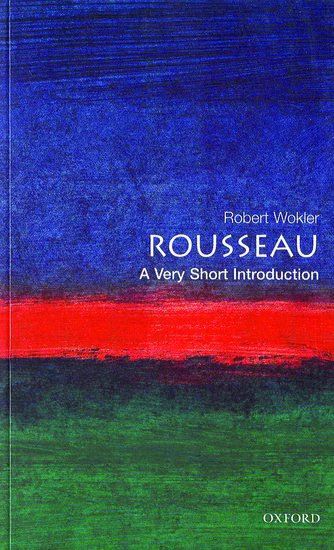Home >
A Very Short Introduction >
Rousseau (Philosophy)
A Very Short Introduction | Philosophy
Rousseau
ISBN: 9780192801982
Series: A Very Short Introduction
Rousseau (Philosophy)
A Very Short Introduction Rousseau (Philosophy) Media > Books > Non-Fiction > Education Books Expect Delays of Up to 4 Weeks| Order Below |
ISBN
9780192801982 (10-digit ISBN: 0192801988)
- Description
- Key Features
- Series Description
- Table of Contents
- Rousseau was a central figure of the European Enlightenment, responsible for the notion of the 'noble savage'
- Examines Rousseau's philosophy of history, his theories of music and politics, his fiction, educational and religious writings, and even his botany
- Ideal reading for students of history, philosophy, and literature of the Enlightenment Period
- There are many longer specialized works on Rousseau's life and work, but none that covers so much ground in such a stimulating and compact way
One of the most profound thinkers of modern history, Jean-Jacques Rousseau (1712-78) was a central figure of the European Enlightenment. He was also its most formidable critic, condemning the political, economic, theological, and sexual trappings of civilization along lines that would excite the enthusiasm of romantic individualists and radical revolutionaries alike.In this study of Rousseau's life and works Robert Wokler shows how his philosophy of history, his theories of music and politics, his fiction, educational and religious writings, and even his botany, were all inspired by visionary ideals of mankind's self-realization in a condition of unfettered freedom. He explains how, in regressing to classical republicanism, ancient mythology, direct communion with God, and solitude, Rousseau anticipated some post-modernist rejections of the Enlightenment as well.
Oxford's Very Short Introductions series offers concise and original introductions to a wide range of subjects--from Islam to Sociology, Politics to Classics, Literary Theory to History, and Archaeology to the Bible.
Not simply a textbook of definitions, each volume in this series provides trenchant and provocative--yet always balanced and complete--discussions of the central issues in a given discipline or field. Every Very Short Introduction gives a readable evolution of the subject in question, demonstrating how the subject has developed and how it has influenced society. Eventually, the series will encompass every major academic discipline, offering all students an accessible and abundant reference library.
Whatever the area of study that one deems important or appealing, whatever the topic that fascinates the general reader, the Very Short Introductions series has a handy and affordable guide that will likely prove indispensable.
Please note: As this series is not ELT material, these titles are not subject to discount.
1.: Life and times of a citizen of Geneva
2.: Culture, music, and the Corruption of Morals
3.: Human nature and civil society
4.: Liberty, virtue and citizenship
5.: Religion, education, and sexuality
6.: Vagabond reverie
Further reading, Index
One of the most profound thinkers of modern history, Jean-Jacques Rousseau (1712-78) was a central figure of the European Enlightenment. He was also its most formidable critic, condemning the political, economic, theological, and sexual trappings of civilization along lines that would excite the enthusiasm of romantic individualists and radical revolutionaries alike.In this study of Rousseau's life and works Robert Wokler shows how his philosophy of history, his theories of music and politics, his fiction, educational and religious writings, and even his botany, were all inspired by visionary ideals of mankind's self-realization in a condition of unfettered freedom. He explains how, in regressing to classical republicanism, ancient mythology, direct communion with God, and solitude, Rousseau anticipated some post-modernist rejections of the Enlightenment as well.
Key Features
- Rousseau was a central figure of the European Enlightenment, responsible for the notion of the 'noble savage'
- Examines Rousseau's philosophy of history, his theories of music and politics, his fiction, educational and religious writings, and even his botany
- Ideal reading for students of history, philosophy, and literature of the Enlightenment Period
- There are many longer specialized works on Rousseau's life and work, but none that covers so much ground in such a stimulating and compact way
Series Description
Oxford's Very Short Introductions series offers concise and original introductions to a wide range of subjects--from Islam to Sociology, Politics to Classics, Literary Theory to History, and Archaeology to the Bible.
Not simply a textbook of definitions, each volume in this series provides trenchant and provocative--yet always balanced and complete--discussions of the central issues in a given discipline or field. Every Very Short Introduction gives a readable evolution of the subject in question, demonstrating how the subject has developed and how it has influenced society. Eventually, the series will encompass every major academic discipline, offering all students an accessible and abundant reference library.
Whatever the area of study that one deems important or appealing, whatever the topic that fascinates the general reader, the Very Short Introductions series has a handy and affordable guide that will likely prove indispensable.
Please note: As this series is not ELT material, these titles are not subject to discount.
EASY ORDER FORM
PRICES LISTED INCLUDE CONSUMPTION TAX
Price Before Tax:
¥1,790


